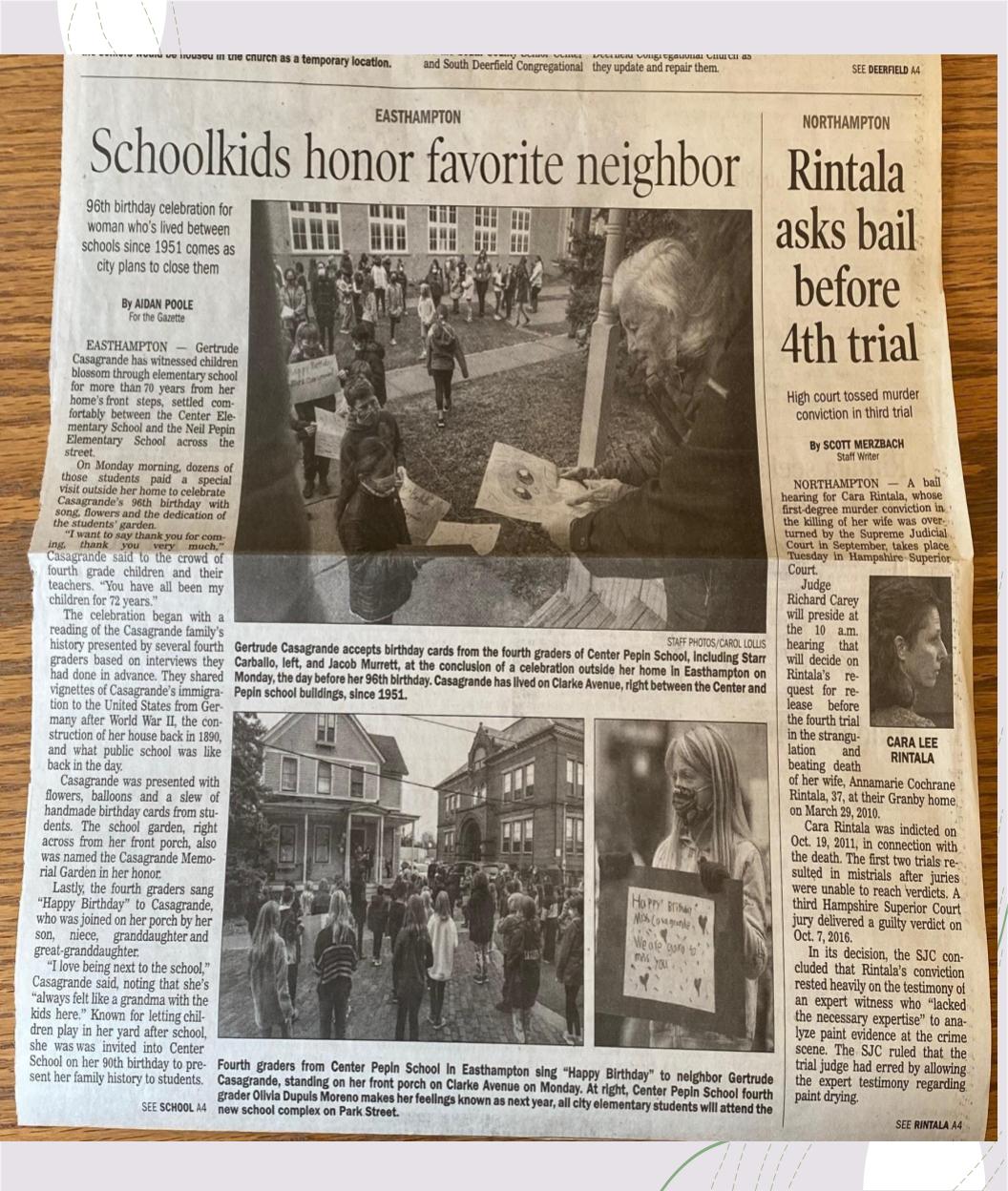Students Spellbound by Uncovering their School's Early History
English Learners' Questions Connect School with Neighbors
Guest post by Jaqueline LaFrance
This post appeared in edited form in the Daily Hampshire Gazette column Chalk Talk, on November 18, 2022.
At this time last year, my six Grade 4 English Language Learner students at Center Pepin Elementary School in Easthampton, Massachusetts were hard at work coming up with questions, grammatically challenging for English Language Learners, to ask our dear neighbor, Ms. Casagrande and her family. We were engaged in writing interview questions as part of a larger school-wide and year-long history project since we would be moving to a brand new building, Mountain View School, the following fall. We wanted to record important school and town history before the buildings were abandoned and the sounds of children playing at recess no longer animated the downtown.
Before we could formulate our questions, we needed to research the history of the last century and learn some new words such as timeline, century, technology, and invention. We practiced asking questions by inverting the subject and verb word order in our sentences. Students worked on their own personal timelines, recording when they were born, when siblings were born, when they moved to the US and or to our town, when they started Kindergarten, when the corona virus sent us teaching and learning remotely, and other important events in their lives. Then we started our Center Pepin School Timeline which began in 1905, over 100 years ago.
We then compiled a list of inventions. Students excitedly chose inventions they were interested in such as the typewriter, the telephone, television, computers, the internet, smart phones, etc. As students used Wikipedia to discover when these various 20th and 21st century inventions were mass-produced and sold to consumers, they proudly added the date and their name next to the invention on our master list, and then added the invention to our school timeline. This work helped the children to formulate historical questions pertinent to our inquiry: What was life like for schoolchildren and families in Easthampton over the last 100 years? How did life evolve and ultimately change? What aspects of daily life didn’t change? What has endured?
The students were getting it! We excitedly co-created a list of about 25 questions. Because of COVID, we knew we needed to conduct our interview outside. And we needed to do it before it became too cold. In late October of 2021 we met Ms. Casagrande’s son, Steve, out in their front yard. The students took turns asking their questions about what it was like to go to school at Center Pepin in the 1950’s and 1960’s. Steve talked about the old school furnaces, how most of the teachers walked to work, and how most families had one car. He described having to practice hiding under his desk during air raid drills. One of Steve’s middle school friends brought lunch to his dad at one of the local mills (since all the students went home for lunch) and ended up staying at the mill and working full time.
The students were spellbound as Steve’s stories captured their imaginations and helped them to imagine what his childhood was like. They were connecting with the past and building community with each other, neighbors and the town. They were building knowledge as young citizens and they were intrigued to know that Ms. Casagrande herself was an immigrant. She came to the US and moved into her house next to the school in the 1950’s. They asked Steve questions about how his mother learned English and if she knew other languages. They discovered they shared similar experiences with Ms. Casagrande and her family.
During our interview, the students asked when Ms. Casagrande was born. When we added this date to our Center Pepin School timeline, the students discovered she was turning 96 years old on November 23rd! Working with school administrators, we planned a birthday celebration for Ms. Casagrande, to honor her and her many years of being a caring and kind neighbor. Our Grade 4 EL students practiced taking turns introducing the family to the four classes of their 4th Grade peers and our special quests who would be gathered. They were nervous about holding center stage and reading with a microphone in front of such a crowd, over 80 people. I convinced them that we would have plenty of time to practice reading their individual parts in the introduction script and that they weren’t going to be alone; we would all be together.
On the day of the event, they all did a fabulous job. My colleagues and I were very proud of them. I think the experience of researching and asking important questions, writing and reading for a purpose and for an authentic audience, being instrumental in strengthening community ties and working as a team will stay with them for years to come.
Jacqui LaFrance has been working as an elementary English Language Teacher for over 13 years in high and low incidence English Language districts in Western Massachusetts. She is an English Language Specialist at the Collaborative for Educational Services Emerging America program. She works on the English Learner Collaborations Project which is funded by a grant from the Library of Congress Teaching with Primary Sources program to the Massachusetts Council for Social Studies. See a longer profile on the Emerging America Team page.






